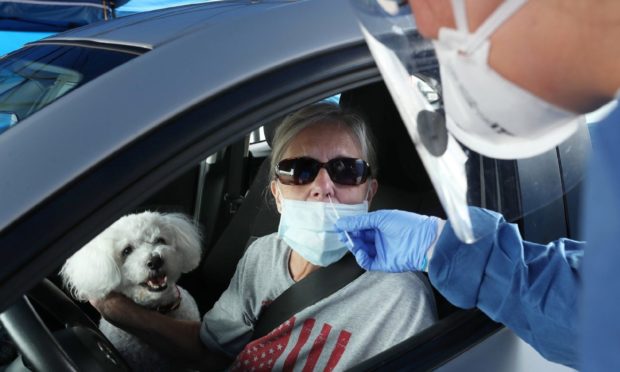Amid a surge in cases in Dundee, NHS Tayside has issued a plea to locals to make twice-weekly testing part of their routine.
The health board has also issued a set of myth busters to help people understand why coronavirus testing is important, especially after so many have been vaccinated.
It comes after city council leader John Alexander warned complacency was not an option in the face of soaring infection rates.
Dundee has recorded a case rate per 100,000 people almost double the Scottish average, and more than triple the rate in Fife.
In light of the increase in cases, NHS Tayside has launched a drive to encourage people to take up testing twice weekly, even if they have no symptoms.
Dundee Covid testing drive – 4 myths busted
1. Why should I get tested if I have no symptoms?
Evidence suggests that people can be infected with coronavirus without knowing it, and they could spread it to loved ones or others in the community.
NHS Tayside says around one in three people with Covid-19 have no symptoms, and testing regularly allows them to be identified so they can self-isolate.
2.Vulnerable people have been vaccinated, so why does an increase in cases matter?
NHS Tayside explained: “Covid-19 can affect people of all ages, including those who are not yet eligible for vaccination.
“The virus can also leave people with long term side effects even if they have not required hospital care, so stopping the virus spreading helps protect everyone in society.
“Although the vaccine offers high levels of protection, it does not give 100% protection so some vulnerable members of our community could still catch Covid and become ill even if they have had both doses of the vaccine.”
3. The new cases haven’t led to an increase in hospital admissions
NHS Tayside warned that it can take around two weeks for the impact of rising cases to be seen in hospital admission data.
But they added: “Other areas across Scotland with high case rates have seen a sharp increase so it’s best that we act now to try and stop the spread in the community as quickly as possible.”
4. Does asking people without symptoms to get tested mean the vaccines don’t work?
“Latest research suggests that both Pfizer and AstraZeneca vaccines are highly effective against the new variant first identified in India (now called the Delta variant). Receiving both doses of the vaccine gives between 60 to 80% protection.
“However it is important to get both doses to obtain maximum protection.
“In Tayside, more than 75% of adults have had the first vaccine and 45% have completed the course with both doses.
“Many of the new cases over the past couple of weeks have been in people who have not yet been fully vaccinated.
“That is why it is really important for everyone to take up the offer of vaccination when you are offered,” the health board said.
People across Dundee have also been asked to enjoy this weekends Euro 2020 match carefully.
Director of Public Health Dr Emma Fletcher said: “We understand that supporters will be looking forward to watching Scotland and other nations at the Euros and want to celebrate this occasion, especially after the difficult year we have all had to live through.
“However, it is crucial that people remember that the Covid-19 risk has not gone away. We have seen cases rise in recent weeks and we all have to play our part to reverse this.
“I would encourage supporters to mark the occasion safely by enjoying the football within Covid-19 restrictions.
‘We need a real push to stop the spread of infection’
“If you are watching matches with family or friends, at home or in the pub, please stick to the limits of people and households for your area.
“Continue to wear a face covering, meet outside wherever possible, avoid crowded places, wash your hands regularly and most importantly, if you develop symptoms, isolate immediately, along with your household, and book a test.
“In Dundee in particular there has been a significant increase in cases over the past week, with the city now having the highest rate in Scotland.
“So we need a real push to stop the spread of infection. Please get tested, even if you don’t have symptoms, if you’ve been tested before or if you’ve been fully vaccinated.
“By testing and identifying positive cases as early as possible, we can ensure people isolate and break the chain of infection.
“So please visit one of our testing centres, mobile vans or pick up a rapid test kit to self-test at home.”
